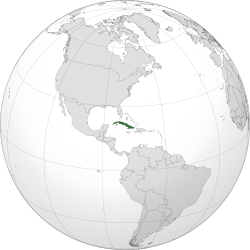Loading AI tools
1898–1902 U.S. military occupation and administration of Cuba From Wikipedia, the free encyclopedia
The Military Government of Cuba (Spanish: Gobierno Militar de Cuba) was a provisional military government in Cuba that was established in the aftermath of the Spanish–American War in 1898 when Spain ceded Cuba to the United States.[1][2]
This article needs additional citations for verification. (June 2016) |
Military Government of Cuba Gobierno Militar de Cuba | |||||||||
|---|---|---|---|---|---|---|---|---|---|
| 1898–1902 | |||||||||
| Motto: E Pluribus Unum "Out of Many, One" | |||||||||
| Anthem: Salve, Columbia "Hail, Columbia" | |||||||||
 | |||||||||
| Status | United States military occupation (1898–1899) Administered territory of the United States (1899–1902) | ||||||||
| Capital | Havana | ||||||||
| Common languages | Spanish, English | ||||||||
| Government | Military Government | ||||||||
| Military-Governor | |||||||||
• 1898–1899 | Adolfo Castellanos | ||||||||
• 1899 | John R. Brooke | ||||||||
• 1899–1902 | Leonard Wood | ||||||||
| Historical era | Modern Era | ||||||||
| 20 April 1898 | |||||||||
| 10 December 1898 | |||||||||
| 2 March 1901 | |||||||||
| 20 May 1902 | |||||||||
| |||||||||
| Today part of | Cuba | ||||||||
This period was also referred to as the First Occupation of Cuba, to distinguish it from a second occupation from 1906 to 1909. United States Army forces involved in the garrisoning of the island during this time were honored with the Army of Cuban Occupation Medal after its establishment in 1915.
The Platt Amendment defined the terms by which the United States would cease its occupation of Cuba. The amendment, placed into an army appropriations bill was designed to give back control of Cuba to the Cuban people. It had eight conditions to which the Cuban Government needed to adhere before full sovereignty would be transferred. The main conditions of the amendment prohibited Cuba from signing any treaty allowing foreign powers to use the island for military purposes. The United States also maintained the right to interfere with Cuban independence in order to maintain a certain level of protection of life, though the extent of this intrusion was not defined. Most significant, the amendment forced the Cuban Government to sign a treaty officially binding the amendment to law.
The United States reasoning behind the amendment was based on the significant commercial interests held on the island. Spain had previously been unable to preserve U.S. interests and maintain law and order. At the end of military occupation, the amendment served as the primary method of ensuring a permanent presence. Due to the previously enacted Teller Amendment, the United States was forced to grant Cuba its independence after Spanish rule ended. Since the Platt Amendment was successfully incorporated into the constitution in Cuba, influence was maintained without direct U.S. involvement in the country.[4]
Seamless Wikipedia browsing. On steroids.
Every time you click a link to Wikipedia, Wiktionary or Wikiquote in your browser's search results, it will show the modern Wikiwand interface.
Wikiwand extension is a five stars, simple, with minimum permission required to keep your browsing private, safe and transparent.